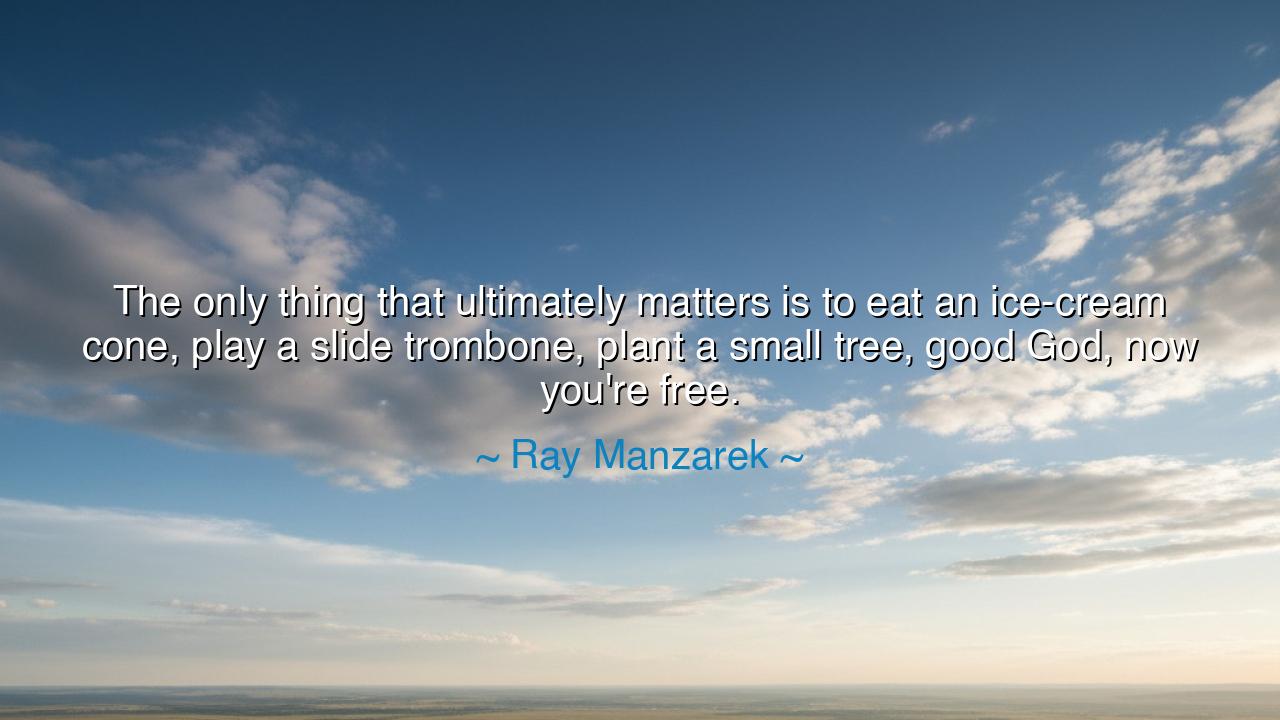
The only thing that ultimately matters is to eat an ice-cream
The only thing that ultimately matters is to eat an ice-cream cone, play a slide trombone, plant a small tree, good God, now you're free.






“The only thing that ultimately matters is to eat an ice-cream cone, play a slide trombone, plant a small tree, good God, now you’re free.”
So declared Ray Manzarek, the philosopher-musician, the co-founder of The Doors, and the keeper of the mystical flame that burned through the art of the sixties. These words, half poem and half revelation, shine with the laughter of enlightenment. They are not mere whimsy, nor a passing jest. They are a hymn to the sacred simplicity of life, a reminder that freedom does not dwell in wealth, fame, or endless striving — but in the pure, living joy of the moment. To “eat an ice-cream cone,” to “play a slide trombone,” to “plant a small tree” — these are the acts of the awakened soul, who finds the infinite in the ordinary.
Ray Manzarek lived at the heart of a time when young men and women sought truth through sound and spirit. As the organist for The Doors, he was both musician and mystic, weaving his art between poetry and prayer. He believed, as the ancients did, that life is divine play — that the human soul is a note in the great cosmic song. When he spoke these words, he was not mocking seriousness but freeing us from its tyranny. The line is a dance of joy: to eat, to create, to nurture, and then to rejoice in being alive. In these small acts, he found the essence of what it means to be free — not the freedom of escape, but the freedom of presence.
The ancients, too, understood this. The Stoics said that peace lies not in changing the world but in changing how one sees it. The Buddha taught that enlightenment is found in mindful attention to every act — even the simplest. To eat an ice-cream cone with awareness, to feel the sweetness melt upon the tongue, is to participate in the miracle of existence. To play a slide trombone, to let music rise from breath and brass, is to join creation in its eternal song. And to plant a small tree is to declare faith in tomorrow — to give back to the earth that gives us life. Manzarek’s words are not random; they are symbolic of the body, the soul, and the earth — the full harmony of living.
Consider the story of Masanobu Fukuoka, the Japanese farmer-philosopher who renounced scientific farming to live in harmony with nature. He found freedom not in rebellion, but in simplicity — in scattering seeds by hand, in letting the land heal itself. “The ultimate goal of farming,” he said, “is not the growing of crops, but the cultivation and perfection of human beings.” Like Manzarek, he discovered that liberation is not hidden in philosophy’s heights, but in the humble rhythm of daily life — in eating, playing, planting, and loving. The path to freedom, both men taught, begins not in the stars but in the soil beneath our feet.
In this light, Manzarek’s words become a form of modern scripture. They tell us to cease overcomplication, to abandon the false gods of ambition and anxiety. Too long have men chased the illusions of power, success, and control, forgetting that joy lives in the simplest gestures of being. The act of creation — whether music, art, or the planting of a tree — is itself sacred. To live with wonder, to delight in the senses, to give something lasting to the earth: these are not small things. They are the true currency of the spirit. When the heart learns this, the prison walls of desire crumble, and one becomes — as Manzarek exclaims — free.
Freedom, then, is not escape from the world, but communion with it. It is to walk barefoot upon the earth, to laugh at the absurdity of fear, to take joy in the fleeting beauty of a melting cone or a trembling leaf. The wise man, like the child, knows how to wonder. The creative man, like the gardener, knows how to give back. The moment we return to these truths, the soul breathes again. In a world obsessed with striving, Manzarek’s words are a clarion call to live vividly, simply, and well — to rediscover the holiness in the ordinary.
So remember this, O traveler through time: the meaning of life is not found in crowns or philosophies, but in presence. Live as one who tastes and listens and plants. Feed your senses, nurture your craft, give life to something beyond yourself. Then pause — laugh, breathe, and thank the heavens for the gift of being alive. For in the end, as Ray Manzarek whispered like a sage of music and sunlight: “Eat an ice-cream cone, play a slide trombone, plant a small tree — good God, now you’re free.” And indeed, you shall be.






AAdministratorAdministrator
Welcome, honored guests. Please leave a comment, we will respond soon